Welcome to our article where we uncover the truth about gluten in fruit. If you’re following a gluten-free diet or have celiac disease, you may wonder if fruit is safe to consume. Let’s dive in and find out!
Gluten is a protein composite found in wheat, barley, rye, and their derivatives. The good news is that fruits do not contain these grains, making them naturally gluten-free. So, if you’re worried about gluten in fruit, fret not! Fruits like apples, oranges, bananas, strawberries, and mangoes are safe and healthy choices for you.
- Fruits are naturally gluten-free as they do not contain wheat, barley, rye, or their derivatives.
- Apples, oranges, bananas, strawberries, and mangoes are gluten-free fruits that are safe for individuals with celiac disease or gluten intolerance.
- Enjoying gluten-free fruits provides essential nutrients, vitamins, and fiber for overall health and well-being.
- While fruits themselves do not contain gluten, there is a risk of cross-contamination during handling and processing.
- To ensure gluten-free fruit consumption, choose certified gluten-free fruits or wash and prepare fruits carefully.
Understanding Gluten-Free and the Importance of a Gluten-Free Diet
Celiac disease is an autoimmune condition triggered by gluten, a protein composite found in wheat, barley, rye, and their derivatives. This condition causes damage to the small intestine, leading to various symptoms and long-term health complications. Individuals with celiac disease must follow a strict gluten-free diet to manage their condition effectively.
In addition to celiac disease, there is also a condition known as gluten sensitivity or non-celiac gluten sensitivity. People with this condition experience symptoms similar to celiac disease when consuming gluten, but without the same immune system response or intestinal damage. A gluten-free diet is crucial for managing both celiac disease and gluten sensitivity.
For individuals following a gluten-free diet, fruits can be a safe and healthy choice. Fruits do not contain gluten and can be enjoyed without worrying about adverse reactions. They provide essential nutrients, vitamins, and fiber, contributing to overall health and well-being. Including a variety of gluten-free fruits in the diet offers a delicious way to meet nutritional needs while managing gluten intolerance.
To ensure gluten-free fruit consumption, it is advisable to opt for certified gluten-free fruits or carefully wash and prepare fruits. Cross-contamination can occur during handling and processing of fruits, which may introduce gluten from other sources. By choosing certified gluten-free fruits or practicing proper food preparation techniques, individuals can enjoy the benefits of gluten-free fruits while minimizing the risk of gluten contamination.
Benefits of a Gluten-Free Diet
A gluten-free diet has numerous health benefits, especially for individuals with celiac disease or gluten sensitivity. It helps alleviate symptoms, promotes gut healing, supports nutrient absorption, and reduces the risk of associated health conditions. By following a gluten-free diet and incorporating gluten-free fruits into their meals, individuals can lead a healthier and more enjoyable lifestyle.
Gluten-Free Fruit Alternatives
While most fruits are naturally gluten-free, some individuals may have specific allergies or intolerances to certain fruits. In such cases, there are gluten-free fruit alternatives available that can provide similar nutritional benefits. Berries, citrus fruits, and tropical fruits are generally safe options for individuals with gluten intolerance or celiac disease. Additionally, gluten-free vegetables like cucumbers, bell peppers, and tomatoes can be included as alternatives. It is essential to read labels and consult with healthcare professionals to ensure that these alternatives are suitable for specific dietary needs.
Gluten-Free Living and Fruit Inclusion in the Diet
Fruit inclusion is a fundamental aspect of gluten-free living. By being mindful of potential cross-contamination risks and making informed choices, individuals can enjoy a varied and nutritious diet while managing their gluten intolerance or celiac disease. The natural gluten-free nature of fruits makes them an excellent option for those following a gluten-free diet, offering delicious flavors and essential nutrients without the worry of triggering adverse reactions.
The Natural Gluten-Free Nature of Fruits
Fruits, such as apples, oranges, berries, and tropical fruits, are naturally gluten-free. They do not contain gluten and can be consumed by individuals with gluten sensitivity or celiac disease without any issues. Fruits are also rich in essential nutrients, vitamins, and fiber, making them a nutritious choice for everyone, including those on a gluten-free diet.
Fruits are a versatile and delicious addition to a gluten-free lifestyle. Whether enjoyed fresh, frozen, or as part of a recipe, fruits offer a wide variety of flavors and textures. From sweet and juicy strawberries to tangy citrus fruits, there is a fruit for every taste preference.
Not only are fruits naturally gluten-free, but they also provide numerous health benefits. They are low in calories and high in vitamins, minerals, and antioxidants. Fruits are also a great source of fiber, promoting digestive health and aiding in weight management. Incorporating a variety of fruits into your gluten-free diet can help ensure you are getting the nutrients your body needs.
Benefits of Gluten-Free Fruits:
- Naturally gluten-free
- Rich in essential nutrients
- Low in calories
- High in fiber
- Promote digestive health
- Aid in weight management
- Delicious and versatile
When enjoying fresh fruits, it is important to wash them thoroughly to remove any traces of dirt or pesticide residue. Peel fruits like oranges and bananas to ensure they are free from any potential contaminants. By taking these simple precautions, you can enjoy the natural gluten-free goodness of fruits while maintaining a healthy and safe gluten-free diet.
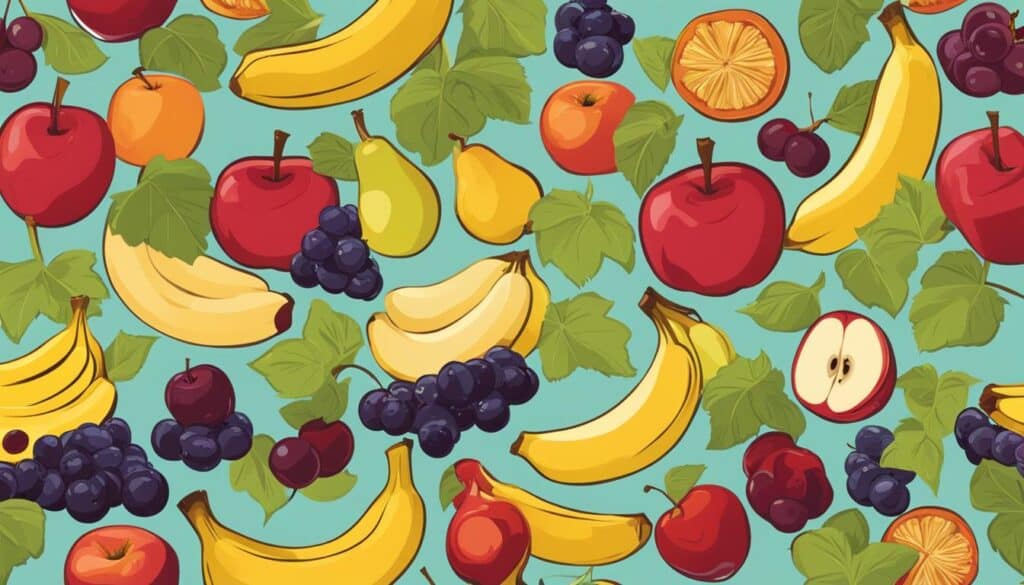
Cross-Contamination Risks in Fruit
While fruits themselves do not contain gluten, it’s important to be aware of the potential risks of cross-contamination. Cross-contamination can occur during handling and processing if fruits come into contact with gluten-containing products or surfaces. This can pose a problem for individuals with severe gluten intolerance or celiac disease.
To minimize the risk of cross-contamination, it is advisable to opt for certified gluten-free fruits or take extra precautions when preparing fruits at home. Thoroughly washing fruits with water can help remove any potential traces of gluten. Additionally, using separate cutting boards, utensils, and storage containers for gluten-free fruits can help prevent cross-contamination.
“Cross-contamination can happen easily, so it’s crucial for individuals with gluten intolerance or celiac disease to be vigilant when it comes to their fruit consumption,” says Dr. Jessica Smith, a nutrition expert. “By following proper food handling practices and choosing certified gluten-free options, they can enjoy fruits without compromising their dietary needs.”
If you’re unsure about the gluten-free status of a particular fruit or fruit product, it’s always best to check the label for any potential ingredients or allergen warnings. Some manufacturers may provide information about their facility’s practices regarding gluten cross-contamination to help consumers make informed choices.
| Fruit | Potential Cross-Contamination Risk |
|---|---|
| Pre-cut fruit salad | Possibility of cross-contamination if processed in facilities that also handle gluten-containing products |
| Frozen fruit | Possible cross-contamination if processed on shared equipment |
| Fruit juices | Risk of cross-contamination if processed in facilities that also handle gluten-containing products |
| Fruit-flavored snacks or candies | Possible gluten-containing ingredients or cross-contamination depending on the manufacturing process |
By being aware of cross-contamination risks and taking appropriate measures, individuals can incorporate gluten-free fruits into their diet safely and confidently, reaping the numerous health benefits they provide.
How to Ensure Gluten-Free Fruit Consumption
When it comes to enjoying gluten-free fruits, there are a few key steps you can take to ensure that you are making safe and healthy choices for your diet. Whether you have celiac disease, a gluten sensitivity, or simply follow a gluten-free lifestyle, these tips will help you navigate the world of fruit consumption without any worries.
1. Purchase Certified Gluten-Free Fruits
One of the easiest ways to ensure that the fruits you are consuming are truly gluten-free is to look for the certified gluten-free label on the packaging. This label indicates that the product has undergone testing and meets the strict standards set by gluten-free certification organizations.
2. Wash and Prepare Fruits Carefully
Even if you purchase fruits that are labeled gluten-free, it’s always a good idea to wash and prepare them carefully before consumption. This helps remove any potential traces of gluten that may have come into contact with the fruit during the handling or packaging process.
3. Check Labels and Avoid Cross-Contamination
When purchasing pre-cut fruits or fruit products, it is important to check the labels for any gluten-containing ingredients. Additionally, be cautious of potential cross-contamination risks. If the fruits were processed in facilities that also handle gluten-containing products, there is a chance of gluten contamination. To minimize these risks, opt for certified gluten-free products or choose whole fruits that you can wash and prepare yourself.
By following these simple guidelines, you can enjoy gluten-free fruits with confidence, knowing that you are making the best choices for your dietary needs.
The Benefits of Enjoying Gluten-Free Fruits
Including gluten-free fruits in a balanced diet offers numerous health benefits. Fruits are rich in vitamins, minerals, and antioxidants, promoting overall health and well-being. They also provide dietary fiber, aiding in digestion and maintaining a healthy weight. For individuals with celiac disease or gluten sensitivity, gluten-free fruits offer a safe and delicious way to meet their nutritional needs without triggering adverse reactions.
Consuming gluten-free fruits can help individuals with celiac disease or gluten sensitivity maintain a healthy gut and reduce inflammation. Fruits like berries, citrus fruits, and tropical fruits are known for their high antioxidant content, which helps protect against oxidative stress and supports the immune system.
Moreover, gluten-free fruits are a great source of dietary fiber, which aids in digestion and promotes bowel regularity. Fiber also helps control blood sugar levels, lower cholesterol, and support weight management.
Incorporating gluten-free fruits into a well-rounded diet not only enhances nutritional intake but also adds variety and flavor. Fruits can be enjoyed in a variety of ways, such as fresh, frozen, or blended into smoothies. They can also be used as ingredients in gluten-free recipes, such as fruit salads, gluten-free fruit tarts, or gluten-free fruit muffins.
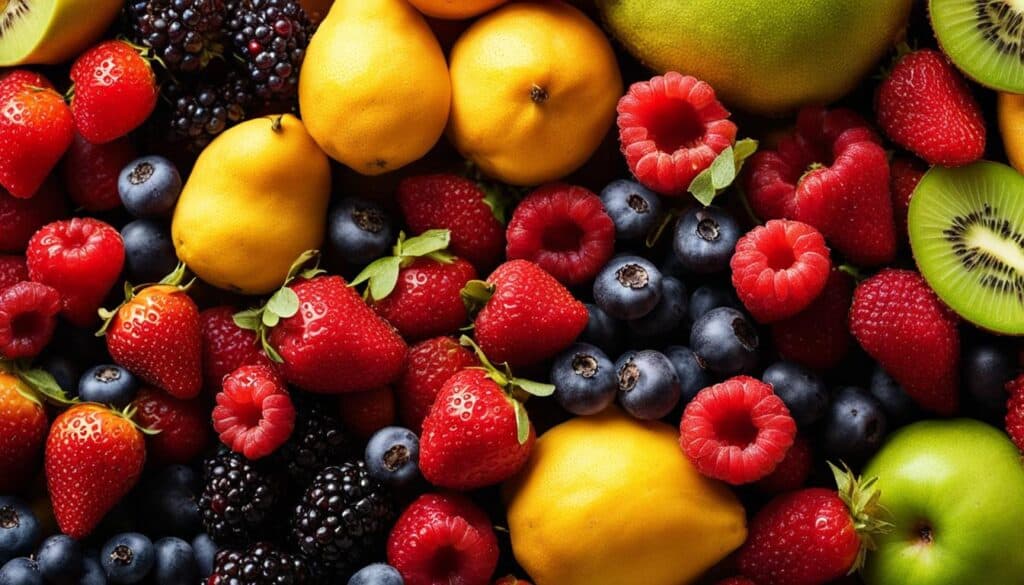
Key Benefits of Gluten-Free Fruits:
- Rich in vitamins, minerals, and antioxidants
- Dietary fiber aids digestion and weight management
- Supports a healthy gut and reduces inflammation
- Enhances variety and flavor in a gluten-free diet
Conclusion:
Gluten-free fruits offer a safe and nutritious option for individuals with celiac disease or gluten sensitivity. Including a variety of gluten-free fruits in the diet provides essential nutrients, fiber, and antioxidants, contributing to overall health and well-being. Whether enjoyed fresh, frozen, or incorporated into recipes, gluten-free fruits are a delicious way to meet dietary needs and add flavor to a gluten-free lifestyle.
Delicious Recipes Featuring Gluten-Free Fruits
Adding gluten-free fruits to your diet can open up a world of delicious culinary possibilities. Whether you’re looking for a refreshing snack or a satisfying dessert, these recipes will satisfy your cravings and keep you nourished.
Berry Quinoa Salad
Ingredients:
- 1 cup cooked quinoa
- 1 cup mixed berries (strawberries, blueberries, raspberries)
- 1/4 cup chopped fresh mint
- 1/4 cup crumbled feta cheese (optional)
- 2 tablespoons lemon juice
- 1 tablespoon honey
Instructions:
- In a large bowl, combine the cooked quinoa, mixed berries, fresh mint, and crumbled feta cheese.
- In a separate small bowl, whisk together the lemon juice and honey.
- Pour the lemon-honey dressing over the quinoa salad and toss to combine.
- Serve chilled and enjoy!
Gluten-Free Fruit Crisp
Ingredients:
- 4 cups sliced gluten-free fruits (apples, peaches, berries)
- 1 cup gluten-free oats
- 1/2 cup almond flour
- 1/4 cup honey
- 1/4 cup melted coconut oil
- 1 teaspoon cinnamon
Instructions:
- Preheat your oven to 350°F (175°C) and lightly grease a baking dish.
- In a large bowl, combine the sliced gluten-free fruits and spread them evenly in the greased baking dish.
- In a separate bowl, mix together the gluten-free oats, almond flour, honey, melted coconut oil, and cinnamon until well combined.
- Sprinkle the oat mixture over the fruits in the baking dish.
- Bake for 30-35 minutes, or until the fruit is tender and the topping is golden brown.
- Allow to cool slightly before serving. Serve with a scoop of dairy-free ice cream for an extra treat!
These gluten-free recipes are just the tip of the iceberg. Get creative in the kitchen and experiment with different fruits and flavor combinations. From smoothies and fruit tarts to muffins and cakes, the possibilities are endless when it comes to incorporating gluten-free fruits into your meals. Enjoy the natural sweetness and health benefits of fruits while staying true to your gluten-free lifestyle.
Gluten-Free Fruit Alternatives
While fruits are naturally gluten-free, some individuals with specific allergies or intolerances may need to explore gluten-free fruit alternatives. These alternatives can provide similar nutritional benefits and delicious flavors without triggering adverse reactions. Here are some gluten-free fruit alternatives that individuals with celiac disease or gluten sensitivity can enjoy:
Berries:
Berries such as strawberries, blueberries, raspberries, and blackberries are excellent gluten-free fruit alternatives. They are packed with antioxidants, vitamins, and fiber, making them a nutritious choice for a gluten-free diet.
Citrus Fruits:
Oranges, lemons, grapefruits, and other citrus fruits are also gluten-free options. They are not only delicious but also rich in vitamin C and other essential nutrients that support immune function and overall health.
Tropical Fruits:
Tropical fruits like pineapple, mangoes, and papayas are gluten-free alternatives that can add a tropical twist to your diet. These fruits are known for their unique flavors and are a great source of vitamins, minerals, and dietary fiber.
| Fruit | Nutrition Benefits |
|---|---|
| Berries | High in antioxidants and fiber |
| Citrus Fruits | Rich in vitamin C and other nutrients |
| Tropical Fruits | Unique flavors and a good source of vitamins and minerals |
When incorporating gluten-free fruit alternatives into your diet, it is important to read labels and consult with healthcare professionals to ensure that these alternatives are suitable for your specific dietary needs.
By exploring the wide range of gluten-free fruit alternatives, individuals with celiac disease or gluten sensitivity can still enjoy the goodness of fruits while managing their dietary restrictions.
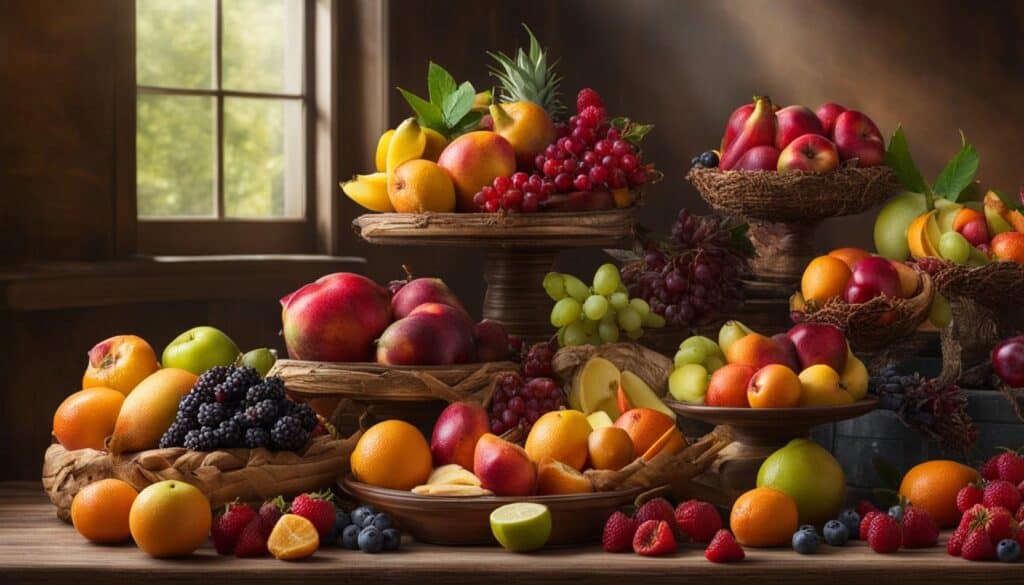
Gluten-Free Living and Fruit Inclusion in the Diet
Adopting a gluten-free lifestyle is a crucial step for individuals with gluten intolerance or celiac disease. It involves making informed choices about food consumption to ensure the elimination of gluten from their diet. One of the key considerations is the inclusion of gluten-free fruits, which provide a plethora of benefits while adding variety to their meals.
Fruits are a natural and delicious option for individuals following a gluten-free lifestyle. They offer essential nutrients, vitamins, and fiber, promoting overall health and well-being. Whether it’s a refreshing apple, a juicy orange, or a tangy berry, gluten-free fruits can be enjoyed in their purest form without worrying about adverse reactions.
To make sure that gluten-free fruits are truly safe, it’s important to be mindful of potential cross-contamination risks. Opting for certified gluten-free fruits is one way to ensure that the fruits have been carefully handled and processed in a gluten-free environment. Additionally, individuals can take extra precautions by thoroughly washing and preparing fruits before consumption, reducing the likelihood of any traces of gluten.
| Fruits Recommended for Gluten-Free Living | Fruits to Avoid for Gluten-Free Living |
|---|---|
| Apples | Oats (may be cross-contaminated with gluten) |
| Oranges | Wheat-based products |
| Berries | Barley-based products |
| Tropical fruits (mangoes, pineapples) | Rye-based products |
By incorporating a variety of gluten-free fruits into their diet, individuals can enjoy the goodness of these vibrant and nutritious options while managing their dietary needs. From mouth-watering fruit salads to refreshing smoothies, the possibilities are endless when it comes to creating delicious meals with gluten-free fruits. Embrace the abundance of nature’s offerings and savor the flavors while nourishing your body.
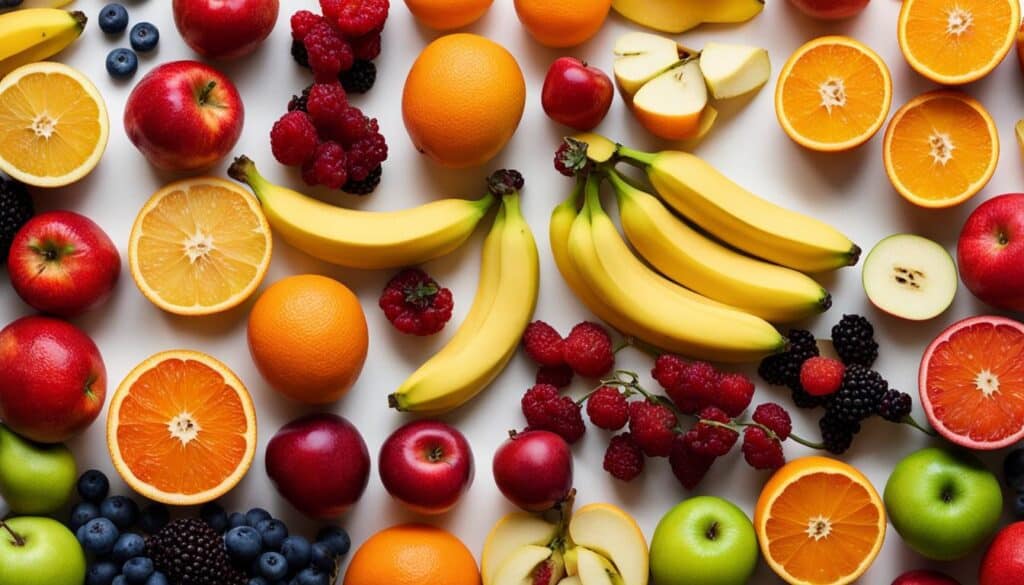
Conclusion
In conclusion, fruits are a natural and delicious option for individuals with gluten sensitivity or celiac disease. Fruits, such as apples, oranges, berries, and tropical fruits, are naturally gluten-free and can be enjoyed without worry. They provide essential nutrients, vitamins, and fiber, contributing to a healthy and balanced diet.
While there is a risk of cross-contamination during handling and processing, individuals can take steps to ensure gluten-free fruit consumption. Opting for certified gluten-free fruits or carefully washing and preparing fruits can help minimize any potential risks. It is also important to read labels and consult with healthcare professionals for personalized guidance on following a gluten-free diet.
Including gluten-free fruits in the diet offers numerous health benefits. Fruits are not only rich in vitamins, minerals, and antioxidants, but they also promote digestion and aid in maintaining a healthy weight. By making informed choices and being mindful of potential cross-contamination risks, individuals can enjoy the goodness of fruits while effectively managing their gluten intolerance or celiac disease.
FAQ
Does fruit contain gluten?
No, fruit is naturally gluten-free. Gluten is a protein composite found in wheat, barley, rye, and their derivatives, none of which are present in fruits.
Can individuals with celiac disease or gluten sensitivity eat fruit?
Yes, individuals with celiac disease or gluten sensitivity can safely consume fruit as part of a gluten-free diet.
What is celiac disease?
Celiac disease is an autoimmune condition triggered by gluten, causing damage to the small intestine.
What is gluten sensitivity?
Gluten sensitivity refers to individuals who experience symptoms similar to celiac disease when consuming gluten but do not have the condition.
Are all fruits gluten-free?
Yes, all fruits, including apples, oranges, bananas, strawberries, and mangoes, are gluten-free.
Is there a risk of cross-contamination with gluten in fruit?
While fruits themselves do not contain gluten, there is a risk of cross-contamination during handling and processing, especially if processed in facilities that also handle gluten-containing products.
How can I ensure gluten-free fruit consumption?
To ensure gluten-free fruit consumption, it is recommended to purchase certified gluten-free fruits or thoroughly wash and prepare fruits to minimize potential cross-contamination.
What are the benefits of including gluten-free fruits in my diet?
Including gluten-free fruits in your diet offers numerous health benefits, as they are rich in essential nutrients, vitamins, and fiber.
Are there gluten-free recipes that incorporate fruits?
Yes, there are countless delicious gluten-free recipes that incorporate fruits, such as fruit salads, smoothies, tarts, and muffins.
Are there gluten-free alternatives to fruits for individuals with specific allergies or intolerances?
Yes, individuals with celiac disease or gluten sensitivity can enjoy gluten-free alternatives like berries, citrus fruits, vegetables, and other gluten-free fruits.
How can I incorporate gluten-free fruits into my gluten-free lifestyle?
Including gluten-free fruits in your diet is a fundamental aspect of a gluten-free lifestyle. By making informed choices and seeking guidance from healthcare professionals, you can enjoy the goodness of fruits while managing your dietary needs.

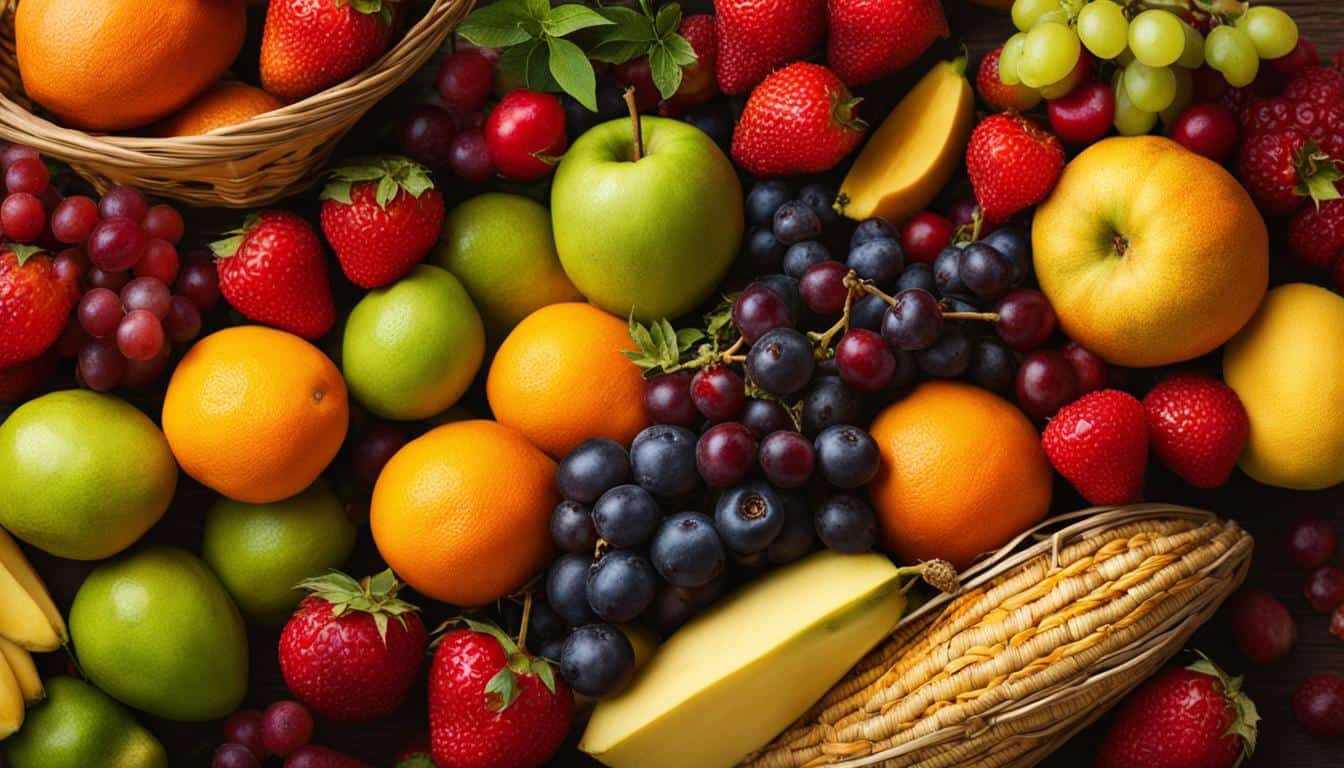



Leave a Reply